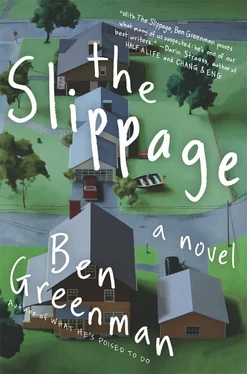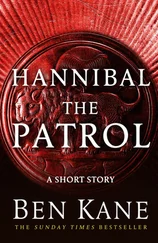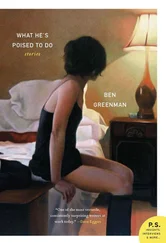Tom was already jabbering as he got into the car: about how skillfully he had deceived Louisa, calling her Wednesday night to complain about a meeting with a cross-state curator that had been called for too early Friday morning (“I even made up a nickname for him to make it seem more real,” he said); about his calculated but entirely believable weariness as he explained that his car was in the shop again; about the silently counted pause before he proposed that William take the trip with him. “I copped to being a terrible driver,” he said, “although I admitted that I don’t mind your company. She gave her blessing. Go ahead, husband, go off with my crazy brother for a road trip where God-knows-what will happen. Who knows, maybe another boss will get punched.” He was looser than usual, almost happy.
The expressway was mostly clear, and the directions Tom gave were surprisingly direct: head north for an hour and west for a quarter of that, at which point there would be a lake and, just beyond it, a town. They passed through gridded suburbs, a large town studded with church spires, a designer village that seemed to be composed solely of historically preserved mansions and bespoke wine shops. They traced the curve of a river and split a grove of trees. The afternoon sun was still strong. “Don’t you want to know where we’re going?” Tom said.
“To see a cross-state curator,” William said. “At least that’s my understanding.”
“Ha ha,” Tom said. “The trip is art-related, actually. We’re going to see one of the greatest painters I know.” They were approaching their destination, and Tom seemed to be feeling the nearness of it. He rocked his weight against the armrest. He rubbed the tips of his sneakers together. He thumped a thumb into the pleat beside him.
“Hey,” Tom said. “I need a place where I can get a little present. Maybe when we stop for gas.” The gas station was next to a modest garden center; Tom settled on a dwarf bottlebrush, which he balanced in his lap like a child. The towns got smaller and the space between them larger. Houses crowded the winding roads. William focused past the windshield, tried to learn from the land, from the people who filled it, but everything seemed behind glass rather than beyond it.
Finally, they pulled up beside a modest, immaculate inn: two stories, a screened porch, a hard-carved sign overhanging the front door that showed two ducks in a pond. As they entered the lobby, heads rose to consider them, then settled back into the business at hand: conversation, magazines, chess. Tom walked to the back of the room, disappeared into a paneled office door, and returned with a tall, thick man, dark skinned and severe of feature. He wore a black poplin shirt with a black suit coat; a stickpin went diagonally through his green tie. “This is Kenneth,” he said. “He works here.”
“That’s a poor introduction,” Kenneth said. “I am the proprietor of this establishment.” His voice rose and fell in a gentle lilt.
“I got you something,” Tom said. He motioned to William to hand it over.
Kenneth took one of the blood-red blooms between his fingers appreciatively. “I like plants.”
“More than people, from what I recall.”
“Can you blame me?” Kenneth said. “Have you met people?”
“This is William,” Tom said.
Kenneth laughed. “Present company excepted, of course,” he said.
They sat at a long table in the lobby. A lamp watched over a stack of tourist brochures. A bottle held a browning mum. “I reread your message this morning,” Kenneth said. “I want you to know that I support this course of action.” His voice was low and level; he seemed like he spoke that way no matter who was in the room.
“I haven’t been able to reach Jesse for a day or two,” Tom said. “I assume things are still on.” His mouth got small when he spoke, as if he was nervous. Was Jesse the man Tom had mentioned on the drive?
“There’s a party tonight,” Kenneth said. “We’re expected to be there.” He turned to William. “You too,” he said.
Kenneth showed them to a room on the first floor, where William flattened himself on the bed. Pen-and-ink birds flew diagonally across the wallpaper, and William imagined them peeling away and circling the room. He must have fallen asleep, because he came awake with a start at the sound of the door opening. The birds went flat again. “Let’s go,” Tom said.
They all packed into Kenneth’s truck, Kenneth and Tom in the front, William in the back. “Sorry for the tight squeeze,” Kenneth said to William. “It’s only a mile.” But a mile meant something different in the country, something bumpier and more vertiginous, and by the time they came to a small house at the round end of a horseshoe driveway, William had to stagger out to steady himself against the truck.
“Come on, city boy,” Tom said. “You have to meet Jesse.”
William heard a voice before the door opened. It was a woman arguing playfully with someone — someone on the telephone, it turned out. She pulled the door open with her free hand and waved them in.
When she saw Tom her eyes widened, in either joy or misgiving. “Gotta go,” she said, and hung up the phone. She was darker than Kenneth, with a tiny frame and nearly perfect features. She could have been a teenager except for the weariness in her eyes.
“This is Jesse,” Tom said. “She was a student of mine. One of the first, in fact.”
“That dates me,” Jesse said.
“That’s what Tom does,” Kenneth said. “He dates you. Or at least he did. All those nights I had to stand on the porch with a shotgun.” Kenneth, William was coming to understand, was Jesse’s father.
“By ‘shotgun,’ I think you mean ‘paintbrush,’” Tom said. “Before Kenneth got into the inn business, he dabbled as an artist.”
“Dabbled?” Kenneth said. “I taught you everything you know.”
“Which is, about painting, exactly zero,” Tom said. “Nice work.”
“While the banter is flying, let me give you a tour of the place,” Jesse said to William. She and Tom still hadn’t really looked at each other.
The tour led through the whole of the house, which was hardly anything, only a living room, a bedroom, and a small yard, but there were careful details everywhere that attested to the vibrancy of the place. The wooden chairs had been carved with a story that went up one arm and came down the other, continuing on the chair beside it. Each of the lampshades had been dyed a subtly different shade. “Sit here,” Jesse said, directing William to a brown leather couch. It was draped in green fabric, like a young woman trying to conceal her beauty or an old woman trying to conceal its absence. A few other guests milled about in the room: two women who appeared to be a couple, two women who did not.
On either side of the front door were two vast canvases, almost floor-to-ceiling, depicting roughly the same scene, an Old West desert with scrub brush in the foreground and distant cliffs. In one, an Indian sat proudly astride a horse, and everything about him was done in vivid color, from the red tips on the feathers of his headdress to the blue squares on his buckskin pants. The other canvas was nearly identical — same desert, same scrub, same horse — but in the Indian’s place was a white man in modern business dress. William wondered if these were the paintings Tom had wanted him to see.
Jesse passed three jelly jars filled with gin to William, who passed the first along to another guest but kept the other two. He felt certain that the real party was on its way, that at some point the front door would fly open and dozens of artists would pour into the house. There would be young men in high spirits and young women pretending at first to resist those high spirits. But the doors never flew open, and William grew more and more drunk, there on the brown couch with the green fabric draped over it. He spoke to a young woman with a shock of orange hair who didn’t complain when he put his hand on her leg. “A cousin,” she said, though he didn’t know whether she was saying that she was Jesse’s cousin, asking if he was Tom’s, or introducing another detail altogether.
Читать дальше












